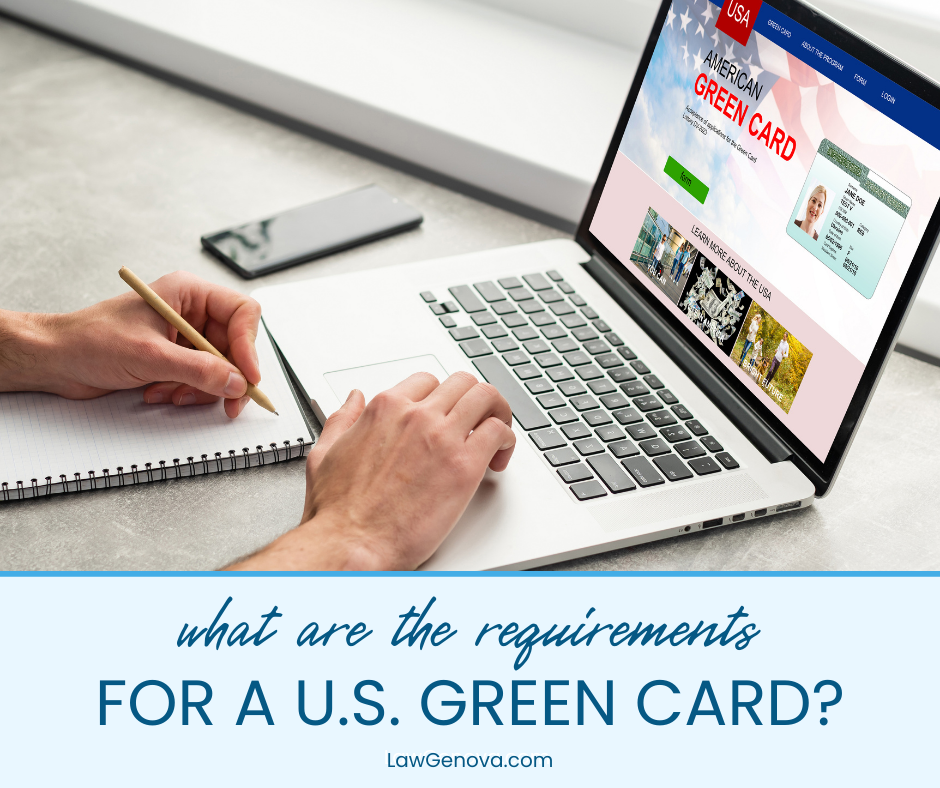If you’re like many people, you’d like to get lawful permanent residency in the United States. Lawful permanent residency enables you to live and work anywhere you wish in the U.S. or its territories. When you’re a lawful permanent resident (LPR), you get a green card; that card is proof of your legal residency in the United States, and it gives you many of the same rights and responsibilities that U.S. citizens have. As a green card holder, you may also later apply for U.S. citizenship if you’d like (though it’s never required; you may remain an LPR for the rest of your life if you want to). But what are the requirements for a green card, and what do you need to do to get one? This guide explains.
Requirements for a Green Card: What You Need to Know
The U.S. government requires you to meet certain criteria to get a green card, and the criteria vary based on the reason you qualify for lawful permanent residency status. For example, someone who’s married to a U.S. citizen must meet different requirements than, say, an investor who puts money into a U.S.-based business. The best way to determine what criteria you need to meet is to talk to a New York immigration attorney who understands U.S. immigration law and how it applies in your situation.

Who’s Eligible for a Green Card?
Not everyone is eligible for a green card – and you must be eligible before you may apply. Generally, you may only apply for one of the following:
- Green card through family
- Green card through employment
- Green card as a refugee or asylee
- Green card as a special immigrant, a human trafficking or crime victim, victim of abuse, or registry
- Green card through other categories
Here’s a closer look at each.
Requirements for a Green Card Through Family
If you want to get a green card through your family relationships, you must be related to a U.S. citizen or LPR in one of the following ways:
- You’re the spouse of a U.S. citizen or LPR
- You’re the child of a U.S. citizen, regardless of your age or marital status
- You’re an unmarried child of an LPR
- You’re the parent of a U.S. citizen, if the U.S. citizen is over the age of 21
- You’re the married child of a U.S. citizen
- You’re the brother or sister of a U.S. citizen
Requirements for a Green Card Through Employment
If you want to get a green card through your employment, you must fall into one of the following categories:
- You have an offer of permanent employment in the United States
- You’re an investor or entrepreneur who’s going to create jobs in the United States
- You have extraordinary ability in the sciences, arts or business
- You’re a religious worker
- You’re coming to the United States to perform temporary services or labor, if no qualified U.S. workers are available
- You’re an Iraqi or Afghan national who assisted the U.S. government
- You’re a broadcaster for an international organization
- You have been granted a national interest waiver
Requirements for a Green Card as a Refugee or Asylee
If you want to get a green card as a refugee or asylee, you must meet the following criteria:
- You’re currently residing in the United States after having been granted refugee status or asylum
- You’re a spouse or unmarried child of a refugee or asylee who’s residing in the United States
Related: Can an undocumented immigrant get legal status?
Requirements for a Green Card as a Special Immigrant, Human Trafficking Victim, Crime Victim, Victim of Abuse, or Registry
If you want to get a green card as a special immigrant, as a victim of crime, human trafficking or abuse, or through registry, you must meet specific criteria. The following sections outline the requirements for each.
Special Immigrants
Special immigrants are generally:
- Religious workers
- Juveniles who need the protection of a juvenile court due to abuse, abandonment or neglect
- Afghanistan or Iraq nationals who performed certain roles for the U.S. government during wartime
- International broadcasters
- Employees of international organizations or family members of NATO-6 employees
Victims of Crime, Abuse or Human Trafficking
You must have a T nonimmigrant visa or U nonimmigrant visa to apply for a green card as a victim of human trafficking or crime. If you’re a victim of abuse, you may be eligible to apply as a:
- Self-petitioner under the Violence Against Women Act (VAWA), but you do not need to be a woman to apply under this category
- Special immigrant juvenile who has been abused, abandoned or neglected by a parent and has Special Immigrant Juvenile status
- A victim of battery or extreme cruelty under the Cuban Adjustment Act or the Haitian Refugee Immigrant Fairness Act (HRIFA)
Registry
If you’ve continuously resided in the U.S. since before January 1, 1972, you may be eligible to register for a green card.
Requirements for a Green Card Through Other Categories
The following table outlines a variety of categories that may enable you to get a green card.
| Conditions | Requirements |
| American Indian born in Canada | Born in Canada Have at least 50 percent American Indian blood Maintain a principal residence in the United States |
| Child of a foreign diplomat who was born in the United States | Born in the U.S. to a foreign diplomatic officer who was stationed in the United States at the time of your birth |
| Cuban Adjustment Act | Cuban native citizen or spouse or child of a Cuban native or citizen |
| Diversity Immigrant Visa Program | Selected for a diversity visa by the U.S. Department of State during a diversity visa lottery |
| Haitian Refugee Immigrant Fairness Act (HRIFA) | Spouse or child of a lawful permanent resident who got a green card based on HRIFA |
| Indochinese Parole Adjustment Act of 2000 | Native or citizen of Vietnam, Kampuchea or Laos who was paroled into the United States on or before October 1, 1997 under the Orderly Departure Program, a refugee camp or a displaced person camp in Thailand under certain circumstances |
| Lautenberg parolee | Paroled into the U.S. as a Lautenberg parolee |
| Liberian Refugee Immigration Fairness (LRIF) | Liberian national continuously present in the United States since November 20, 2014 or spouse, child under the age of 21, or unmarried son or daughter over the age of 21 of a qualifying Liberian national |
| Section 13 | Stationed in the U.S. as a foreign diplomat or as another high-ranking official who is unable to return to your home country |
What Requirements Do You Need to Meet if You’re Eligible for a Green Card?
If you’re eligible for a green card, your application process and the documentation you need depend on your situation. For example, a person who has a U nonimmigrant visa must meet different requirements than a person who married a U.S. citizen does.
Your attorney will give you specific guidance based on your case, but in general, you must meet the following requirements to get a green card in the United States:
- Have a sponsor (in most cases)
- Fill out and file the appropriate forms
- Be admissible to the United States
- Go to a biometrics appointment to provide your photo, fingerprints and signature to the U.S. government
- Participate in an immigration interview
Sponsorship for a Green Card
Most people need a sponsor to get a green card. A sponsor is usually a family member or employer who agrees to be financially responsible for you. The sponsor must be a U.S. citizen or have permanent resident status. There are some exceptions, such as if you’re a refugee or asylee, a VAWA self-petitioner or a special immigrant juvenile.
Your sponsor will need to fill out the appropriate paperwork on your behalf.
Green Card Forms
The U.S. government uses several forms to allow people to apply for green cards. The form you need depends on your situation, and your immigration attorney will know which ones to file. Your lawyer will also know what type of supporting documentation you need to provide with your application.
A Word on Admissibility to the United States
You must be admissible to the United States in order to get a green card. This means that the U.S. government doesn’t find you to be a threat to national security or to other citizens, and you don’t have any health concerns that could harm other citizens and lawful permanent residents.
Related: Can you get a green card if you have a criminal record?
Attending a Biometrics Appointment
A biometrics appointment is a meeting with the U.S. government where you provide your fingerprints, photo and signature. This information is used to run a background check on you to make sure that you’re eligible for a green card. It’s also kept on file with the U.S. government.
You’ll receive a notice in the mail telling you when and where to go for your biometrics appointment. This appointment is usually scheduled within a few weeks of filing your green card application.
Participating in an Immigration Interview
The final step in getting a green card is attending an interview with U.S. Citizenship and Immigration Services (USCIS). An immigration officer will ask you questions about your application, and you’ll have the opportunity to clarify anything that needs to be cleared up to move your application forward.
Do You Need to Talk to an Immigration Attorney About the Requirements for a Green Card?
If you need to talk to an immigration attorney, we may be able to help you. Call our office at 914-481-8822 to schedule a consultation with an experienced, knowledgeable immigration attorney who can answer your questions and give you the legal advice you need.


